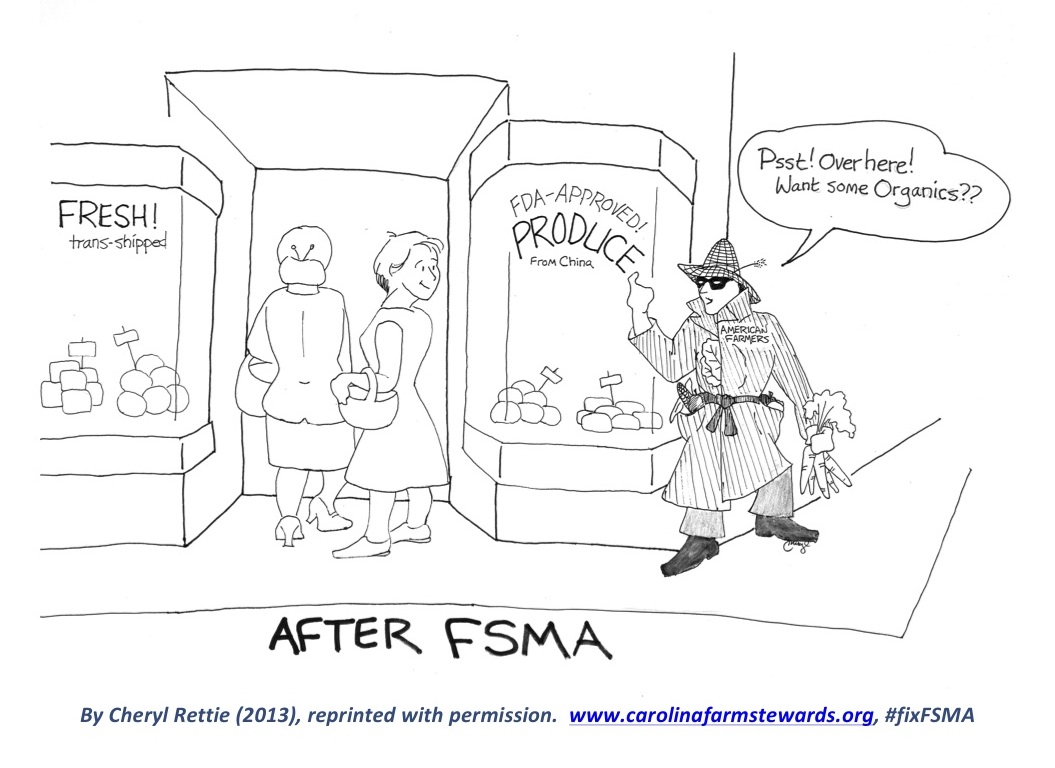Two things you can do today to make the American food system better: Part 1
Author: Kate Fitzgerald
As government agencies get back to work, there are things you can do to help create the food system you would like for this country. There are two easy actions you can take today to make your voice heard.
The U.S. Department of Agriculture (USDA) is asking for feedback on how to improve healthy store choices for SNAP participants, and the Food and Drug Administration wants to know what people think about draft new food safety rules. Today, let’s take a look at food safety.
Friends tell me there are fewer things less engaging for dinner party conversation than American farm policy, but federal safety regulations may be one of them. For once, however, something that seems boring and unlikely to affect you is both interesting and important. Bear with me a moment and you’ll see.
Two years ago, Congress passed the first new food safety legislation in more than 70 years – and it’s a very good piece of legislation. Earlier this year, FDA issued the draft rules it will use to implement the bill – but unfortunately, some of the proposed rules are not good at all. Consumers now have the opportunity to tell the FDA what they think, and anyone who likes to shop at farmers’ markets, thinks farm to school programs can improve children’s nutrition, and/or is a member of a CSA should make their voice heard.
Every farmer, regardless of the size of his/her operation, is responsible for providing the safest, healthiest food possible to customers. No one is exempt from that responsibility. How one fulfills that obligation depends on the kind of farm, however. The Food Safety Modernization Act (FSMA) Congress passed two years ago recognized the need for flexibility but the proposed rules do not.
Farmers who are concerned about the proposed rules are not trying to shirk their duty. They are worried the proposed rules could result in a food system that is not only not safer than the one we have now, but could also bankrupt the very farmers who are doing the most to improve access to affordable healthy food for all Americans.
There are several basic problems with the rules.
- There are not clear definitions that allow farmers to know into what category their farm falls and which rules apply to them. This matters because whether a farm is defined as a “farm” or a “facility” makes a huge difference in which requirements apply to them. It appears that many of the normal processes farmers go through to get their products ready for market (like trimming roots from beets or celery) will be considered processing and will mean they have to follow the same safety regimen that plants with much higher volume and risk potential adhere to.
- There are clear contradictions between the proposed food safety rules and the National Organic Program standards and long-established sustainable production practices.
- The cost of compliance will put many farms out of business, according to FDA’s own economic analysis. With an ever-increasing number of American children overweight or obese and more Americans dying of diet-related health conditions every year, local and regional food systems that connect consumers more directly to farmers are offering great promise. The proposed FSMA rule could nip that progress in the bud by creating unreasonable requirements for farmers, and new small businesses aggregating products from several farmers to serve schools, hospitals or other institutions (food hubs). The food supply will not be safer for consumers if the result is that we rely on imported food.

Providers of unsafe food deserve to go out of business. The problem with the rules is that they threaten to put responsible farmers using the best production practices out of business. That doesn’t mean we need no rules at all, but rather that FDA should take more time to learn about farm production and wait until they have the rules right before they make them final. That’s an easy message to send:
- For information on how to submit your comments, visit the National Sustainable Agriculture Coalition website.
Tomorrow: How and why you can give USDA feedback on how to improve healthy store choices for SNAP participants.







